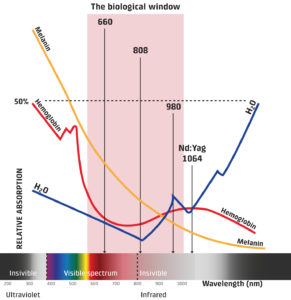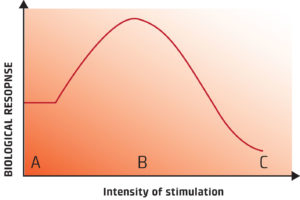Dosage of Laser Therapy
Laser light treatment is the transfer of energy to the cells. Laser light’s energy penetrates the skin and initiates cell functions. This strengthens the immune system and icrease blood flow.
The Effects of Laser Light
Units of measurement:
- A laser’s strength is defined as its effect
- Effect is measured in watts (milliwatt)
Energy is measured in Joule
- Energy is the product of the effect and the treatment time.
Energy (Joule) = effect (Watt) * time (seconds)
Effect of laser in mW: Joule/sec.: 5 Joule = time in seconds:
5 0,005 5 1000
50 0,05 5 100
500 0,5 5 10
1000 1 5 5
3000 3 5 < 2
The effect of the laser determines how fast the energy is transferred to the tissue being treated!
A weak laser needs to be used for a long time, whereas a more powerful laser transmits the energy faster which significantly shortens the treatment time. The effect of the laser has no influence on the depth of penetration of the tissue, as it is only the wavelength of the laser that determines the depth of penetration.
Generally, the more powerful the laser, the more joules are transferred to the tissue thus giving faster treatment results.

Lasers with a very high effect however have a greater risk of overdosing the tissue. Laser therapy, as mentioned, is the transfer of energy to the cells and the amount of energy required for stimulation of the cells is directly proportionate to the number of cells stimulated (area x depth).
This means that surface structures with a small area require lower doses than deeper lying structures with a greater area.
Thus, it is not enough to reduce treatment time on small and/or superficial structures – in this case, the density of effect (Watt/cm2) will be too great. Too great intensity will result in the inhibitions of the cells. If the cells are inhibited, biostimulation will not occur and thus the treatment is ineffective.
The biological response in relation to the amount of energy transmitted to the tissue is described in the “Arndt-Schulz Law”.

A: Low energy transmission has no biological response. B: A wide “therapeutic window” with biological response of laser therapy. C: Too much energy transmitted resulting in biological inhibition.
